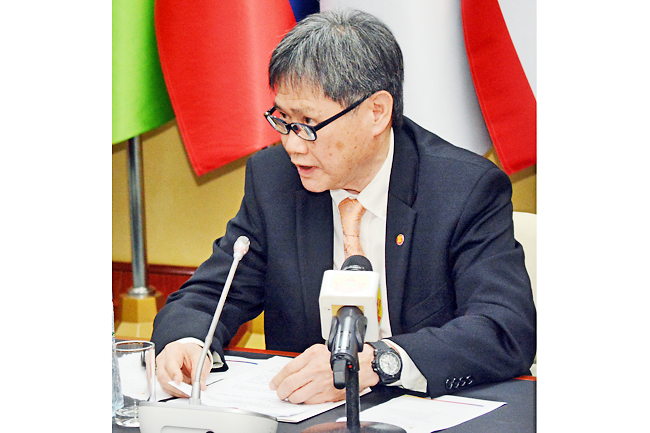James Kon
The Association of Southeast Asian Nations (ASEAN) underscored that its region, especially the business community, is fully committed to fight the COVID-19 pandemic.
This was said by ASEAN Secretary-General Dato Paduka Lim Jock Hoi during the ASEAN Business Advisory Council’s (ASEAN-BAC) 2021 Chairmanship Handover Ceremony at the International Convention Centre yesterday.
While the path to recovery is a joint responsibility of all, it is the business community that has a lot at stake in ensuring businesses continuity, revival of economic activities, protection of work force, stable supply chains and customers’ engagement.
“Last year was particularly challenging for all. COVID-19 disrupted our economies and created a lot of uncertainties among our people and businesses. Despite the difficulties, ASEAN has stood its ground to contain the impact of the crisis. While the pandemic is seemingly far from over, there is no doubt that the region’s coordinated actions have further strengthened our resilience,” Dato Paduka Lim Jock Hoi said.
“The same commitment to work together has helped advance the ASEAN Community last year despite the pandemic. Notwithstanding the disruption in supply chain and trade connectivity, our commitment to market integration under the ASEAN Economic Community has remained unabated, as evident in the signing of RCEP Agreement. Many regional initiatives from trade facilitation to investment and finance and SMEs (small and medium enterprises) development, have been expeditiously put in place while dealing with the cross-border spill-overs of the pandemic.”

He also said the collective actions of ASEAN member states to recover from the pandemic will continue this year.
“The latest IMF (International Monetary Fund) outlook this month still presents a global recovery that is highly uncertain and is prone to setbacks. This means that ASEAN cannot afford to be complacent and we need to work together,” he said.
In these challenging times, Dato Paduka Lim Jock Hoi expressed, “I am glad the private sector like ASEAN-BAC is with us. To be successful, the ASEAN Comprehensive Recovery Framework needs to be supported by everyone. Instead, we need the support of stakeholders in the region, particularly our business community, including by undertaking joint activities with governments to support the recovery.”
He also outlined several approaches on how ASEAN-BAC and the region can work together.
First, Dato Paduka Lim Jock Hoi said, “We need ASEAN-BAC to support business continuity by providing the catalyst for cross-border productive activities through business models that are more agile and flexible. This is needed to restore confidence and maintain market stability.
“Within the region, efforts are being explored as an immediate step to re-invigorate economic activities while promoting public health safety, such as the ASEAN travel corridor. In my view, we need creative solutions like the ‘travel corridor’ to gradually open our economy. This arrangement also signifies the ability of countries in the region to work and cooperate together for a common goal.”
Second, he said, “We need ASEAN-BAC to assist in restoring the supply chain and trade connectivity by making supply chains stronger and more resilient. One possibility is for companies to invest in digital technologies that can be used for mapping and monitoring supply networks. Such mapping will help smoothen flows across production functions and optimise processes along the supply chains.”
Another way to support supply chain resilience is through digital trade and e-commerce. “We need the private sector to invest more on e-commerce platforms to enable fast and secure cross-border movement of goods and services to help economic recovery and job creation after the pandemic.”
Dato Paduka Lim Jock Hoi commended the ASEAN-BAC for developing its 2021 Legacy Project entitled ‘Harnessing Impact with Resilient Employability Digitally’ (HIRED), which will play an important role in supporting the recovery by strengthening the capacity of ASEAN human capital to embrace the future of work and digitalisation.
He applauded the ASEAN-BAC for its commitment to close cooperation with the ASEAN Future Workforce Council (AFWC) to implement this Legacy Project. This is a good and sound approach since the AFWC is one of the private sector representatives in the ASEAN Technical and Vocational Education and Training (TVET) Council, which is a multi-sectoral and cross-sectoral body with a vision to advance TVET in ASEAN for enabling future-ready human capital with higher productivity to embrace the digital economy.
Through the partnership with the AFWC, he added, “You can channel the output resulting from the Legacy Project to be further discussed with the ASEAN TVET Council and to support ASEAN’s efforts in strengthening the capacity of its human capital.”
The ASEAN Secretary-General urged the need for the private sector’s aid in the recovery initiatives.
“We need the private sector in financing the recovery and mobilising resources for various initiatives under the recovery framework. For example, the private sector can work with the government in setting up some kind of liquidity fund to support small businesses with grants and working capital loans to make them viable again.
“In addition, they can support the production of medical supplies that will still continue to be needed during the recovery phase,” he said.
While financing is one priority, he said another imperative is sustainable investment such as green infrastructure and other low-carbon investments that have high multipliers and other attractive co-benefits. To do this, it will be critical to get the investment decisions right by strengthening public and private finance, as well as mobilising all financing tools for a sustainable future of ASEAN.